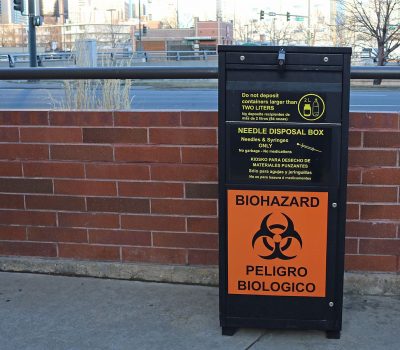
By Rin Velasco and Katarzyna Jezak
Pharmacy chains with more than three Boston locations will need to provide safe sharps disposal sites, in accordance with an ordinance passed Wednesday by the Boston City Council.
The ordinance will go into effect next October, and pharmacies that do not comply will face a $300-per-day fine.
Councilor Annissa Essaibi-George, who sponsored the ordinance, said the rule will provide places for free and safe sharps disposal for those struggling with substance addiction as well as people with medical conditions who use intravenous medication.
“Right now, individuals who are using needles at home are throwing them in the trash, are flushing them down the toilet, are improperly disposing of them,” Essaibi-George said. “That has a very specific impact on … our garbage system. It has a very specific impact on our waterways.”
Sharps are medical objects used to inject substances into a vein, which can vary from insulin for diabetics to fentanyl for individuals facing addiction, said Malaika Lucien, Essaibi George’s director of communications.
The pharmacies, she said, will create up to 100 locations for proper disposal across Boston as a result of the order.
This will increase access to and lower the cost of proper sharps disposal, Lucien said, as well as fight the stigma surrounding sharps possession.
“Prior to the ordinance and in other cities and towns, it does actually cost money to dispose of your sharps, which creates a huge financial barrier,” Lucien said. “We’re creating a free, safe and non-stigmatizing option for residents.”
Matthew Blanchette, a manager of retail communications for CVS, wrote in an email that the company will work to comply with the ordinance over the next year, adding that “proper disposal is important.”
Some Boston residents have expressed concerns about needles littered in popular areas for using and selling drugs.
One stretch of Massachusetts Avenue in Roxbury and the South End, known as the Methadone Mile, has been the epicenter of this problem. Addiction recovery services were moved to the area after the Long Island Bridge closed in 2014, cutting off access to a recovery campus on the island.
While the opioid epidemic’s severity in Boston poses a serious challenge, Essaibi-George said, the ordinance is an important step.
“I don’t think there’s a person that is untouched by the opioid crisis,” Essaibi-George said. “This isn’t something that’s going to fix the opioid crisis, not by a long shot. But, this is certainly an effort to mitigate some of the impact of the opioid crisis.”
This is an account occasionally used by the Daily Free Press editors for posts with multiple authors or otherwise for special circumstance publications. See authorship info on the byline at the top of the page.




